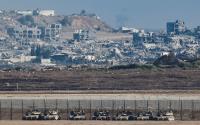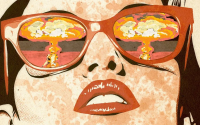10 November 2005Anna Driver
New York Times reporter Judith Miller, hailed by her editors as a champion of press freedom but later criticized in the pages of her own newspaper for her prewar reports on Iraq, will leave the paper, The New York Times (NYT.N: Quote, Profile, Research) said on Wednesday.
Lawyers for Miller, who was at the center of the CIA leak controversy, and the paper negotiated a severance package, terms of which were not disclosed. As part of the agreement, the paper will publish a letter from Miller explaining her position, The Times said on its Web site.
Representatives for Miller did not immediately return calls. The Pulitzer-prize winner, who worked at the paper for 28 years, went to jail for 85 days this summer rather than name her source in the CIA leak case.
Miller's source on the CIA leak story was Lewis "Scooter" Libby, Vice President Dick Cheney's former chief of staff, who was charged on Oct. 28 with obstructing justice, perjury and lying. After the indictment Libby resigned and has since pleaded not guilty.
Asked at an event on Wednesday evening why she had resigned, Miller said: "Because I had become part of the story. I had actually become part of the news, and that's something no New York Times reporter wants to do."
"So much has happened since I was let out of jail ... I really thought it was time to move on," she said during a panel discussion at the Media Law Resource Center.
Miller, 57, who covered national security for The Times, came under professional fire for stories she wrote on weapons of mass destruction in Iraq that echoed Bush Administration stances and turned out to be based on faulty intelligence.
Ahmad Chalabi, the Iraqi leader accused of giving U.S. officials flawed information about Saddam Hussein's weapons program, was a source on prewar Iraq for Miller.
According to The Times' Web site, Miller wrote in her letter, to be published on Thursday, that she had become a "lightning rod for public fury over the intelligence failures that helped lead our country to war" and wanted to leave the paper because she had "become the news."
HARSH MEDIA CRITICS
Executive Editor Bill Keller was quoted in The Times as saying the paper had been hurt by delays in "coming clean" over lapses in its reporting that supported U.S. allegations of Iraqi weapons programs, much of which was written by Miller.
Others were harsher.
New York Magazine wrote in June 2004 that Miller produced "stunning stories about Saddam Hussein's ambition and capacity to produce weapons of mass destruction, based largely on information provided by Chalabi and his allies -- almost all of which have turned out to be stunningly inaccurate."
The flap over Miller's reportage was another blow to the storied paper's reputation. The Times, which prides itself on being America's paper of record, is still trying to restore credibility lost after former reporter Jayson Blair was found to have fabricated and plagiarized dozens of news stories, which The Times detailed in a nearly 14,000-word article.
That scandal led to the exit of two top editors, Howell Raines and Gerald Boyd in 2003.
It also led to the establishment of a public editor to critique Times coverage, and in coming months Miller's reporting of the run-up to the Iraqi war came under fire.
"It's a calamity," Michael Wolff, media critic for Vanity Fair Magazine, told Reuters. "They are going from one calamity to another, like a drunken bunch lurching this way and lurching that way." Wolff characterized the Times as having a "leadership problem of massive proportion."
But on Wednesday, Keller praised Miller.
In a letter to The Times staff, Keller said Miller had "displayed fierce determination and personal courage both in pursuit of the news and in resisting assaults on the freedom of news organizations to report."






